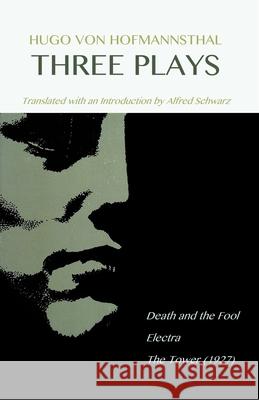Hugo Von Hofmannsthal: Three Plays » książka
Hugo Von Hofmannsthal: Three Plays
ISBN-13: 9780814312865 / Angielski / Miękka / 2017 / 244 str.
Since World War II Hugo von Hofmannsthal has regained his place as a classic of modern European literature. The translations collected here-Death and the Fool, Electra, and The Tower represent different periods and interests in his career as a dramatist. Yet, as the critical introduction on Hofmannsthal's tragic theater indicates, all three plays, written in different theatrical idioms, reveal a unified and developing conception of man's estate in the modern world.
Hofmannsthal rejected the current fashions of the modern stage but was nonetheless a keen observer of his time. His deliberate indebtedness to the great theaters of the past allowed him to enlarge the scope of his own dramaturgy and to use a more articulate language than that afforded by the conventions of the modern realistic theater.
This book includes the 1927 theater version of Hofmannsthal's last great work, The Tower, available for the first time in English translation.
Since World War II Hugo von Hofmannsthal has regained his place as a classic of modern European literature. The translations collected here-Death and the Fool, Electra, and The Tower represent different periods and interests in his career as a dramatist. Yet, as the critical introduction on Hofmannsthal's tragic theater indicates, all three plays, written in different theatrical idioms, reveal a unified and developing conception of man's estate in the modern world.
Hofmannsthal rejected the current fashions of the modern stage but was nonetheless a keen observer of his time. His deliberate indebtedness to the great theaters of the past allowed him to enlarge the scope of his own dramaturgy and to use a more articulate language than that afforded by the conventions of the modern realistic theater.
This book includes the 1927 theater version of Hofmannsthal's last great work, The Tower, available for the first time in English translation.











